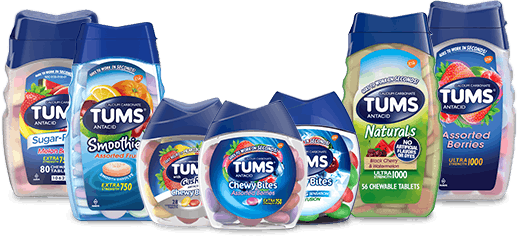Acid Reflux vs. GERD
Being gassy is never fun and can disrupt your lifestyle, whether you feel gassy after a meal, when you’re out with friends, or when you’re trying to fall asleep at night. Luckily we have a few tips and tricks on getting gas relief that can help you avoid this uncomfortable interruption. Read on to find out how to get gas relief and get ready to wave goodbye to pesky gas and bloating.
What Causes Gas?
Gas is a perfectly normal part of a functioning digestive system.1 When we eat and drink, we also swallow air, which gathers in the stomach. A lot of this air—called stomach gas—gets released by burping.1
The gas that’s found in the large intestine is caused by carbohydrates that haven’t been digested in the small intestine and are fermented by bacteria. Some of the gas will be consumed by bacteria, but the gas that’s left in the colon is released via the anus.1
How to Get Relief
Since gas is part of the body’s digestive process, getting rid of gas entirely isn’t possible. However, if you’re experiencing uncomfortable gas pains or excessive flatulence, there are a few solutions you can turn to for general gas relief.
Ditch the straw
While you do swallow air when you eat and drink if you consume beverages through a straw, you are swallowing even more air which turns into stomach gas.1 If it’s possible and comfortable for you, try sipping your beverages instead of consuming them with a straw to cut down on your air consumption.
Cut back on soda
Drinking fizzy or carbonated beverages like soda and seltzer water can also lead to increased amounts of stomach gas.1 Sip on a flatter beverage instead, like fruit juice, herbal tea, or water and take notice of whether it helps you feel less uncomfortable due to gas pain.
Spit out your gum
Like drinking through a straw, chewing gum can also cause us to swallow more air and increase stomach gas.1 Not chewing gum is another way to cut excess stomach gas. For the same reasons, avoid sucking on hard candies as well.
Monitor your fiber intake
We need fiber in our diet to keep the digestive tract working well. But foods that are high in fiber can cause intestinal gas, so talk to your doctor about how you can modify your diet in a healthy way to figure out whether a particular high fiber food is bothering you and causing gas.
Beans, vegetables like broccoli, Brussels sprouts, cabbage, cauliflower, artichokes, and asparagus; fruits including pears, peaches, and prunes; and grains like whole wheat and bran are all high in fiber. Cutting some of these out—or experimenting to figure out if a specific high-fiber food is the culprit—can help give you gas relief.2
Go natural
Many artificial sweeteners and sugar substitutes can lead to excess gas in the colon. Check ingredient lists for sorbitol, mannitol, and xylitol, which are all common artificial sweeteners found in food and beverages.1 Avoid these ingredients to ward off gassiness before it starts.
Hydration, hydration, hydration
We can’t overemphasize the importance of this one—drink lots of water! Staying hydrated is necessary to prevent constipation, not to mention keeping the rest of your body functioning. Make sure you’re drinking water at mealtime and between meals.
If you take a fiber supplement, take it with water as well.2 Keeping a reusable water bottle with you throughout the day can be a helpful reminder to stay hydrated.
Try an over-the-counter gas relief remedy
The easiest way to get fast gas relief is to take an over-the-counter remedy, such as Gas-X or TUMS Chewy Bites with Gas Relief. A product like these contains simethicone, which helps to break up gas bubbles so that gas can pass more easily through your digestive system.2 When you’re looking for quick and reliable relief from gas and bloating, OTC is the way to go.
We hope these tips, tricks, and lifestyle suggestions can help you get gas relief and banish some discomfort from your life. Looking for a product that can help with heartburn and gas relief? Try TUMS Chewy Bites with Gas Relief, a chewable tablet that relieves heartburn, sour stomach, acid indigestion, and gas associated with these symptoms.
SOURCES
- Gas and gas pains: Symptoms & causes. Mayo Clinic.https://www.mayoclinic.org/diseases-conditions/gas-and-gas-pains/symptoms-causes/syc-20372709. Accessed 10/15/20.
- Gas and gas pains: Diagnosis & treatment. Mayo Clinic.https://www.mayoclinic.org/diseases-conditions/gas-and-gas-pains/diagnosis-treatment/drc-20372714. Accessed 10/15/20.


